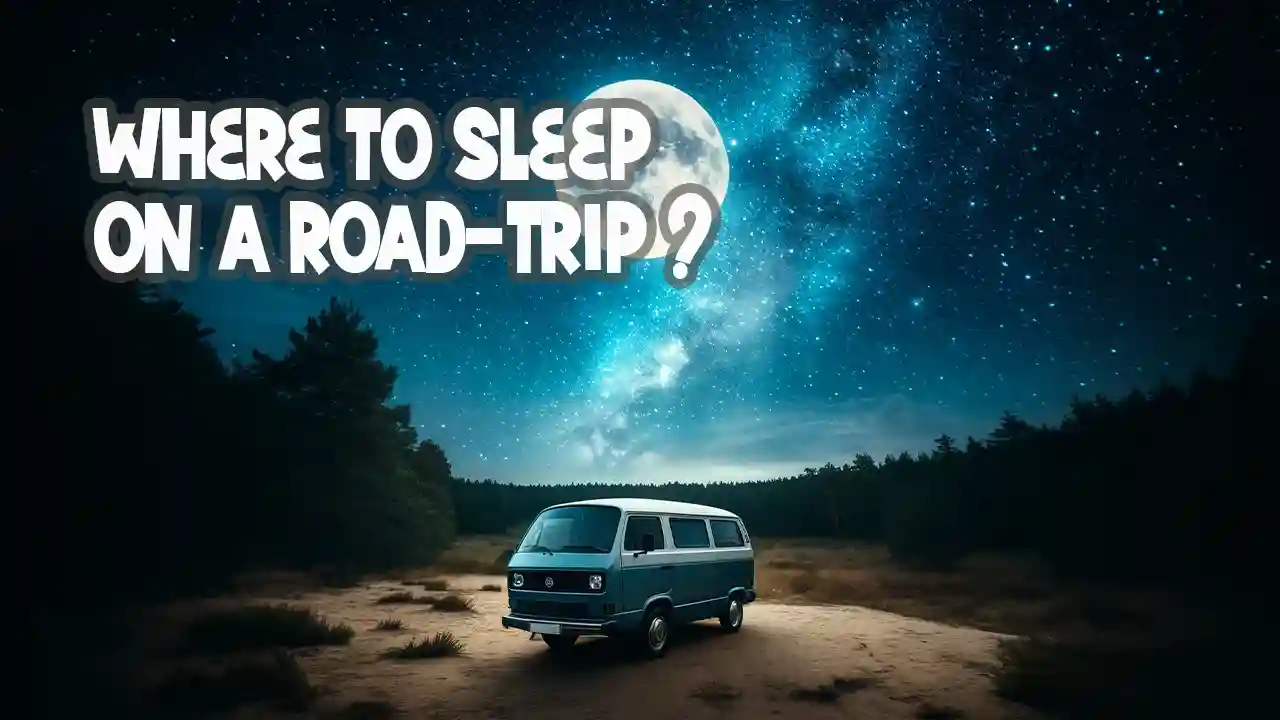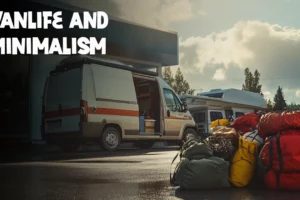
Where to Sleep on a Road Trip
Introduction
Wondering where to park your van for the night? No worries! This article will help you navigate your options: wild nature spots, urban parking, welcoming campsites, staying with locals, or specialized service areas. We’ll break down the pros and cons of each choice so you can make the best decision based on your needs and preferences. Ready to find your ideal spot without hassle? Follow the guide!
Where to Sleep Legally in a Van?
Sleeping in Your Vehicle in France: A grey area? In theory, nothing prohibits sleeping in your van or campervan, but it’s more complex than it seems! Firstly, if you set up equipment outside your vehicle, like chairs or a table, it could be seen as wild camping, which changes the situation. Several places, such as near monuments or nature reserves, are then off-limits at night.
Important Nuances: Where and how to park? You’re allowed to sleep in your van as long as you don’t stay parked in the same spot for more than 24 hours unless otherwise indicated. However, be cautious, as some mayors prohibit van or campervan parking in their towns. Sure, these signs are often illegal, but they exist. If you get fined, you can contest it, though this requires time and patience (you’ll need to pay the costs upfront).
(If you want to dive deeper into these details, check out our article titled “Can You Live in a Van“, where we explore these questions in depth.)
No Parking Signs: What to Do?
In practice, you’ll see signs prohibiting overnight parking for certain vehicles, especially in tourist areas or towns. Despite their presence, these signs aren’t always legal as they discriminate against a specific category of vehicles, those outfitted for camping. However, they are there and must be considered. My advice? If you’re unsure or the sign seems justified (for reasons of safety or access, for example), it’s better to choose another spot.
Smart Advice
To avoid any trouble, do your research before settling in for the night, and above all, respect the environment and local rules to enjoy your adventure without any issues!
How Are Mobile Apps Revolutionizing Spot-Finding for Vanlifers?
Ah, the days when finding the perfect spot was done the old-fashioned way, with a map in hand and adventure just around the corner! Today, mobility, the internet, and remote work have transformed this quest: for better, but sometimes also for worse. Thanks to dedicated apps, finding a place to spend the night is no longer just an adventure but also a convenience.
Park4night and Caramaps are already well-known; they are great allies in finding parking spots. These tools are practical, but they have also popularized some previously secret spots. If you’re seeking authenticity, you might need to dig a little deeper.
- Park4night offers spots everywhere, commented on by users themselves,
- Caramaps stands out with its French touch and numerous practical details.
(For a complete list of the best apps, check out our article on must-have road-trip apps.)

Why Sleep in Nature Spots or Parking Lots in Vanlife?
Finding a free spot to spend the night in your van is undoubtedly the most economical option. As we have often experienced, each spot can be a gem or, on the contrary, a disappointment. The variety is immense: from breathtaking views in the middle of nowhere to just a less glamorous urban parking corner.
What to Expect?
- In Nature: Pure adventure, often off the beaten path. Ideal for those looking to reconnect with nature. These spots often require a bit of research and adventure, and it’s crucial to check that parking is allowed and that you can “escape” easily, just in case! (No pressure though)
- In a Parking Lot: More accessible, but variable in terms of safety and comfort. Some parking lots offer easy access and are tolerated for a night, especially on the outskirts of cities or in less frequented areas.
(Remember, our approach is always to respect the spots: no litter, no excessive noise, and leave without a trace.)
Pros and Cons of Free Spots in Vanlife
Free: No associated costs, allowing you to save on your travel budget.
Connection with Nature: The chance to wake up in stunning and peaceful natural settings.
Total Freedom: Flexibility to choose your spot without the constraint of reservations.
Adventure: Each spot can turn into a unique and exciting discovery.
Community: Sharing information and spots through vanlifer networks.
Uncertain Legality: Risk of violating local regulations without always knowing it.
Safety: Fewer guarantees for personal safety and vehicle protection.
Lack of Amenities: No access to water, electricity, or sanitary facilities.
Isolation: Possibility of feeling too isolated, especially in very remote locations.
Variability: The quality and comfort of spots can vary greatly.
Access: Some sites can be difficult to access for large vehicles or those not suited for rural paths.

Why Stay at Campgrounds?
For the record, if we chose vanlife today, it might be because every summer, my brother Alexandre and I, Xavier, used to join our grandparents at a campground in Port-Grimaud. Ten years of caravans and tents, that’s probably where the bug bit us.
Choosing to sleep at a campground offers significant advantages, especially in terms of security, available services, and respecting legality. It’s an especially attractive option in areas where overnight parking is regulated or strictly prohibited.
What Types of Campgrounds Are There?
- Municipal Campgrounds: Often economical, they are managed by municipalities and located near tourist sites or urban amenities.
- Private Campgrounds: These vary from simple plots to complexes with pools, restaurants, and various activities.
- Nature Campgrounds: Located in the heart of nature, they are ideal for those looking to escape while staying in a secure environment.
For us, campgrounds are rarely our first choice; we mainly use them when there are no free alternatives in urban areas where we need to stay for several days. This is often the case in large cities with strict regulations regarding overnight parking. The variety and services offered by campgrounds can greatly enhance the vanlife experience, especially during long stays in one area. It’s a good strategy to recharge the batteries, both literally and figuratively, before heading back out on the adventure.
Pros and Cons of Campgrounds in Vanlife
Available Services: Access to amenities such as showers, toilets, electricity, and waste disposal.
Security: Often secure environments with surveillance and fencing.
Legality: Camping is generally compliant with local regulations.
Socialization: Opportunity to meet other campers and share experiences.
Activities and Entertainment: Some campgrounds offer activities and entertainment for all ages.
Cost: Staying at a campground costs money and can sometimes be expensive, especially in tourist areas.
Less Adventure: The environment is more controlled and less wild compared to a spot in nature.
Rules and Restrictions: More strict rules to follow (quiet hours, designated spots).
Proximity to Others: Less privacy due to the close proximity of other sites.
Uniformity: Less variety in landscapes and experiences, especially compared to isolated natural spots.

Why Stay sleeping with Locals?
Staying with locals enriches vanlife with convivial moments and authentic encounters. This can often be done simply by making contacts on the road or even through existing connections. These experiences are not only a great way to get closer to locals but also to explore everyday life in different environments.
A Cultural Immersion
Sleeping at a local’s place (well, on their parking spot) opens you up to the daily life of a region and its residents. It’s more than just a place to spend the night; it’s an exchange, a way of living, and sharing unique moments:
- Participating in local life,
- Discovering traditions and customs,
- Engaging in enriching exchanges about different lifestyles.
Little anecdote: Often, our hosts offer us a room, convinced we’ll be more comfortable than in our van. However, we almost always refuse because we love our little nest on wheels. But for a good hot shower, it’s a definite yes!
Pros and Cons of Staying with Locals
Cultural Immersion: Opportunity to closely experience local daily life and learn more about the region.
Enriching Encounters: Possibility to form bonds with locals and other travelers.
Home Comfort: Access to comfortable amenities like hot showers and kitchens.
Security: Often secure parking on private property.
Authenticity: More authentic and personal experience than in a campground or in the wild.
Less Freedom: Often subject to house rules and fixed schedules.
Limited Privacy: Less privacy compared to an isolated spot in nature.
Dependence on the Host: You are not at home, so… you are not at home!

Why sleep in RV Service Areas?
When it comes to vanlife, service areas are essential for accessing amenities like water, electricity, and sanitation facilities. Strategically placed, these areas greatly facilitate life on the road and offer a good price/service ratio.
What Services to Expect?
Generally, these spaces offer:
- Water points for filling tanks or daily needs,
- Electrical hookups to recharge batteries and devices,
- Facilities for waste water disposal.
You might not know it, but there are service areas in many cities, and there’s even a special sign indicating a motorhome service area. Before becoming a nomad, I had never noticed this sign. These areas are not just about comfort; they also represent a legal and safe option for spending the night without breaking local regulations, which are often stricter in large cities or tourist areas. Thus, they ensure a restful and hassle-free night.
Pros and Cons of Service Areas
Essential Amenities: Access to water, electricity, and sanitation facilities for increased comfort.
Assured Legality: Staying in service areas complies with local regulations.
Security: Often monitored and secure environments for users and their equipment.
Socialization: Opportunity to meet other vanlifers and exchange travel tips.
Easy to Locate: These areas are well-signposted and easily found via dedicated apps.
Lack of Charm: Often located in less picturesque areas compared to other spots in nature.
Cost: Some service areas are paid, adding an extra cost to the trip.
Proximity: They can be close to roads or other noise sources, affecting tranquility.
Crowded: In peak season, these areas can become very crowded, reducing privacy and comfort.
Service Limitations: While practical, not all areas offer the same level of services, with some lacking crucial facilities like hot showers.

Why sleep in Specialized Vanlife Networks?
Specialized networks, such as those allowing parking at vineyards and farms, are more than just a parking solution. They offer a window into authentic experiences and enriching encounters. During our first year of road-tripping, constrained by travel restrictions, we extensively used the France Passion network. This provided us with unforgettable moments with the owners of these places.
Encounters in the Heart of the Countryside
Parking in vineyards or farms means immersing yourself in the rural soul of France. You meet passionate people eager to share a part of their daily life. This goes far beyond a simple commercial transaction; it’s often a true cultural exchange:
- Learning about winemaking directly from the vintners,
- Tasting fresh produce just harvested from the land,
- Living at the farm’s pace, even if just for a night.
These networks not only provide a place to park but also enrich the travel experience by connecting vanlifers with local traditions and expertise.
France Passion and Similar Networks Around the World
France Passion has inspired similar networks across Europe and the world. Here are some notable ones:
- Portugal: EasyCamp
- Canada: Terego
- New Zealand: Okay2stay
- USA / Canada: Harvest Hosts
- Germany: Landvergnügen
- Norway: Nordtrip
- Sweden: SwedeStops
- Denmark: Pintrip
- United Kingdom: Brit Stop
- Switzerland: Swiss Terroir
- Austria: Bauernleben
- Italy: Agricamper
These networks not only offer a parking spot but also enhance the travel experience by bringing vanlifers closer to local traditions and know-how.
Pros and Cons of Specialized Networks
Authenticity: Stay in unique places like vineyards or farms for an immersive experience.
Encounters: Direct interaction with owners, often local producers, enriching your journey.
Local Products: Opportunity to buy fresh, high-quality products directly from the source.
Tranquility: Locations often situated in peaceful areas, away from urban hustle.
Support for Small Businesses: Your stay contributes to the local economy and helps preserve traditions.
Limited Availability: Spots can be fewer and may require advanced planning.
Service Variability: Amenities vary greatly from place to place, with some lacking basic services.
Access: Some sites can be difficult to access for large vehicles or those not suited for rural paths.
Cost: Although often reasonable, joining these networks can involve an initial membership fee.
How to Find Spots to Sleep Using Online Communities and Encounters?
In the vanlife world, online communities and word of mouth are goldmines for discovering the best spots. On platforms like Facebook or Telegram, groups dedicated to vanlifers are bustling with daily exchanges about dream locations, often shared generously.
- Websites and Blogs: These are valuable resources, offering detailed reviews and practical advice based on personal experiences.
- Encounters on the Road: Talking with other travelers can lead you to beautiful spots, often the lesser-known ones.
(Don’t forget, the best tips sometimes come from a simple conversation over coffee or a local beer!)



